by Hermione Lai, Interlude
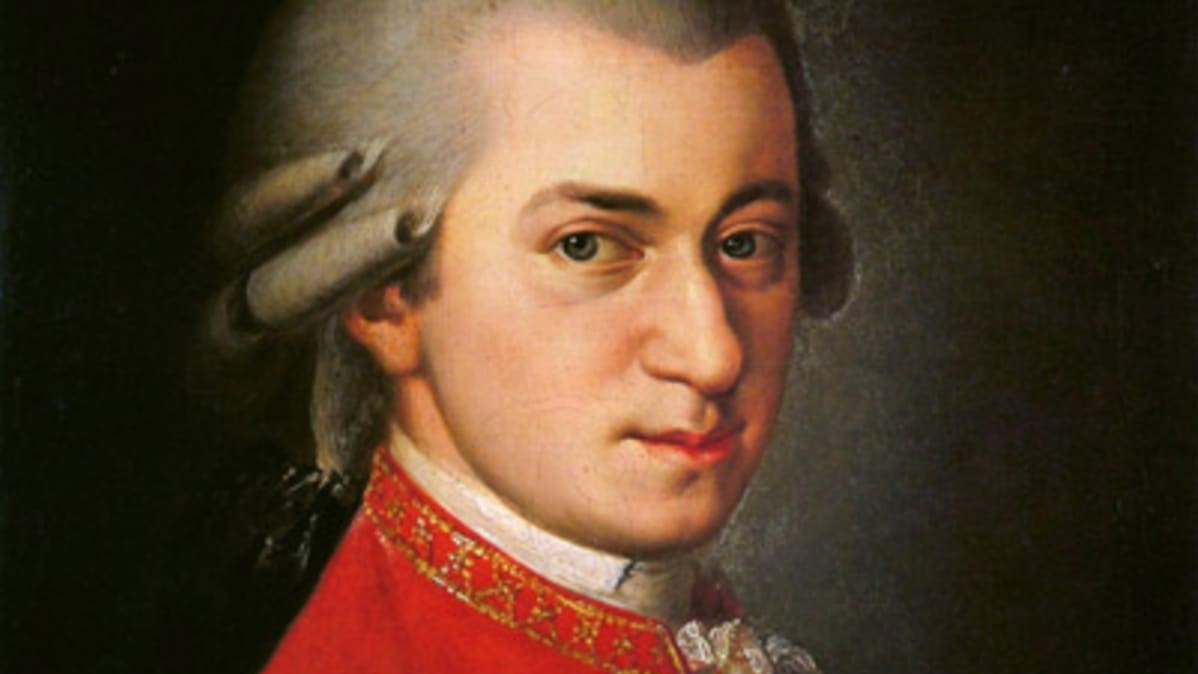
Wolfgang Amadeus Mozart
If we can trust current scholarly opinion, Mozart was a distinguished letter writer. In fact, he is described as “the most eloquent among musicians of his time.” During his travels he was a faithful correspondent, he wrote loving letters to his wife, and long money-seeking letters to friends and patrons. And as we all know, he also wrote some rather naughty letters to his cousin. As an artist profoundly inspired by the theatre, Mozart was an exceptional judge of character. And his letters are not “exotic discoveries suitable for being marveled at in a distant cabinet, but are bearers of communications.”
The Mozart letters are full of both trivial and important observations about the people he met, comments on the reactions to his music, satirical remarks on incompetent professions, thoughts on other composers, the process of performing, and his own methods of composition. But writing a blog on famous quotes from Wolfgang Amadeus Mozart is not so easy. His use of language, his “use of dialect, semantics, and phonology can be difficult for the 21st-century readers to fully understand.” Nevertheless, here are some famous quotes from Wolfgang Amadeus Mozart that present an informal and intimately detailed portrait of a genius.
“Nothing is more enjoyable than a quiet life and to obtain that, one must be industrious”
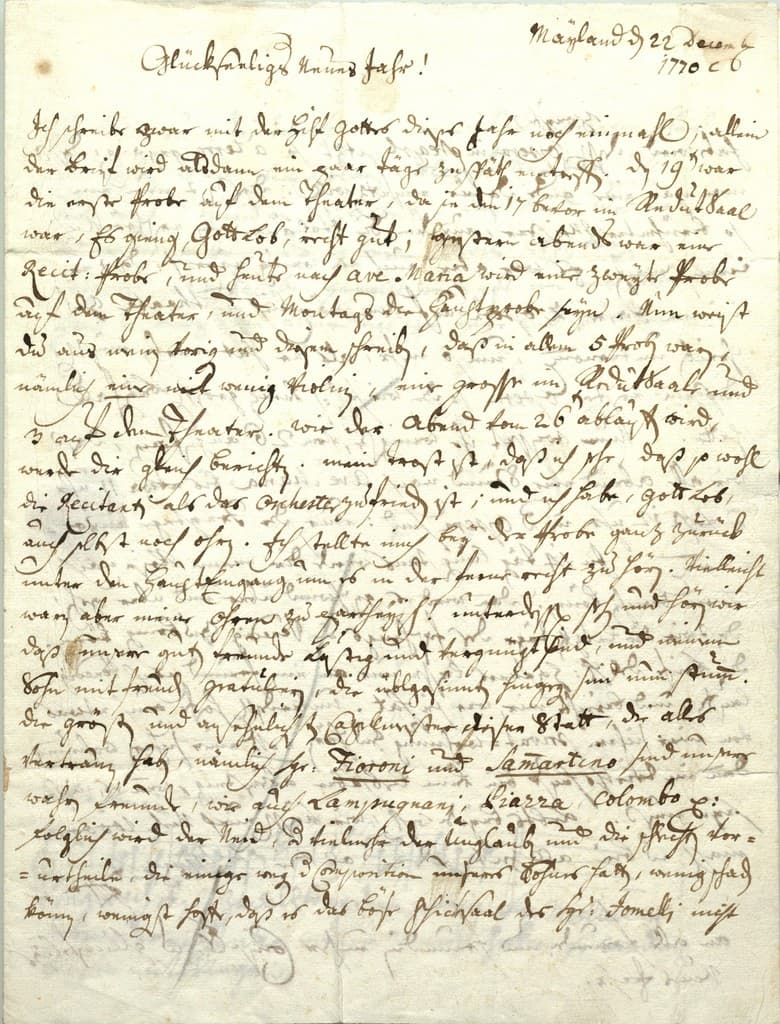
Mozart’s letters
As he wrote to his wife on 8 October 1791, Mozart was probably longing for a life exclusively dedicated to music, without all that financial stuff. He did have a habit of exaggerating his financial difficulties, but he certainly liked fine clothing, expensive apartments, and enjoyed living beyond his means. Some commentators have suggested that he might well have had a gambling problem as well. But one thing is for sure, he was incredibly industrious as a composer. The amount and quality of music composed during his short life is simply staggering. He left us roughly 800 works in virtually every genre of his time of the highest possible quality imaginable.
“Friends who have no religion cannot be long our friends”
Mozart was baptized a Catholic, and the church played an important role in his life. He was raised in a strict religious household with his father enforcing family prayer, fasting, the veneration of saints, regular attendance at mass, and frequent confession. In the words of Leopold Mozart, “God must come first! From his hands, we receive our temporal happiness and our eternal salvation.”
It is hardly surprising that the above famous quote from Wolfgang Amadeus Mozart originates in a letter written to his father in 1782. However, Mozart’s relationship to religion was ambivalent, and his famous quote does not provide reliable information about his convictions but is probably a disguise in order to please his father. But that doesn’t mean that he didn’t compose some of the most spiritual and devotional religious music in existence.
“Constanze is not ugly, but anything but beautiful; all her beauty consists of two little black eyes and a handsome figure”
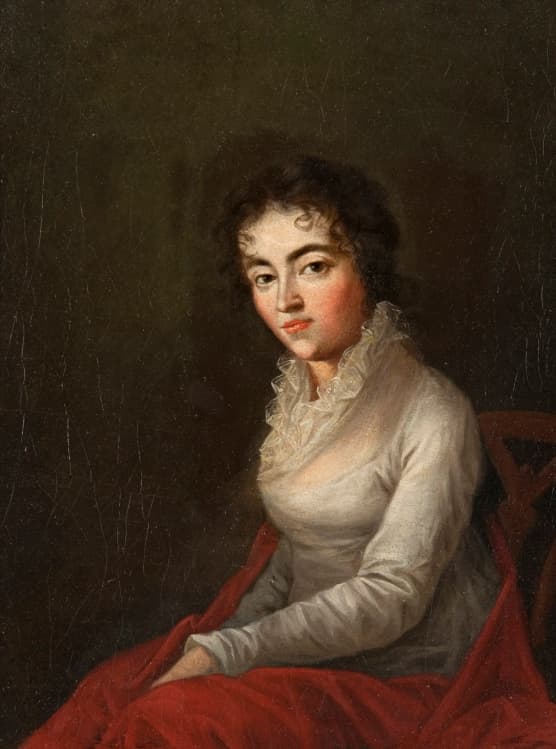
Constanze Mozart
Wolfgang Amadeus Mozart married Constanze Weber on 4 August 1782. Their courtship had not been smooth, and the relationship faced stiff opposition from Leopold Mozart. Leopold did not consider Constanze a good match for his son and didn’t want the marriage to go ahead. A good many letters went back and forth, with Mozart praising the talents of his love and Leopold refusing to let his mind be changed.
It probably didn’t help that the couple moved in together before they were married, making it a real disgrace for the time. Her mother threatened to call the police if she didn’t return home. In the end, Leopold could not prevent the marriage and in order to save face, his consent arrived in the mail one day after the happy event.
“To win applause one must write stuff so simple that a coachman might sing it”
Wolfgang Amadeus Mozart always placed great emphasis on elegant, natural, and singing melodies. He always wanted to communicate through melody. Mozart was essentially an operatic composer, and that particular style carried over into his instrumental works as well. In order to effectively perform Mozart’s music, we need to think like an opera singer but with simplicity of melody that can be easily sung by a coachman as well. In a related famous quote, Mozart wrote, “Melody is the essence of music.”
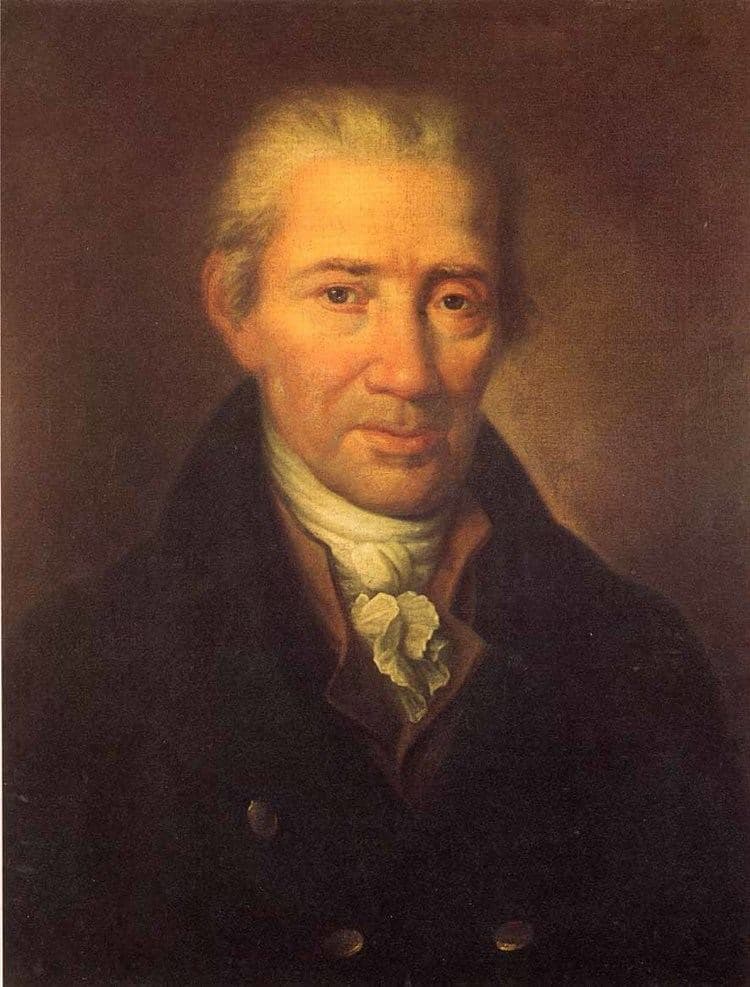
Antonio Salieri
To be sure, Mozart melodies are some of the most memorable pieces of music ever written. Mozart melodies are frequently described as flowing and beautiful, with an unmatched lightness and elegance. Some writers compare them to the sounds of a flowing river or the gentle flutter of a butterfly’s wing. But while they are light and airy, they have deep emotional qualities. Mozart’s melodies have a way of touching the soul and stirring emotions. Remember the Salieri movie, when the jealous composer commented upon hearing a Mozart melody that he had heard the voice of God?
“It is a mistake to think that the practice of my art has become easy to me. I assure you, dear friend, no one has given so much care to the study of composition as I”
Wolfgang Amadeus Mozart was a true child prodigy, and he is very often considered an exceptional and singular musical genius. As a performer, he quickly acquired superstar status and began to compose at the tender age of five. He completed his first symphony before celebrating his eighth birthday and finished his first opera by the age of twelve. And while his natural ability is undisputed, he remained a student throughout his life.
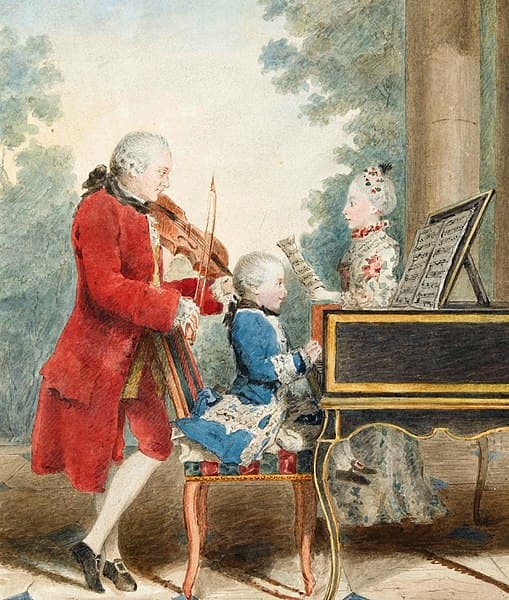
The Mozart family playing chamber music
Mozart unrelentingly integrated, synthesized, and transformed stylistic and musical conventions to produce compositions of universal appeal and stunning individuality. There simply seems to have been no genre or compositional technique in which Mozart was not comfortable. Mozart certainly worked on his compositional craft after he moved to Vienna, and for the first time saw musical manuscripts by J.S. Bach and Handel. He immediately started a concentrated study of counterpoint and began to improvise fugues in the style of Bach. And it was the synthesis of the Classical and learned styles of music that made the true genius of Mozart’s music.
“How popular I would be if I were to lift the national German stage to recognition in music!”
Music had always played an essential role in the daily lives of Habsburg royalty. However, music at court and the opera had been dominated by the highly popular Italian style. However, Emperor Joseph II was eager to challenge that convention by advocating the “Singspiel,” a German-language music drama. His push for an autonomous German opera brought Wolfgang Amadeus Mozart in direct competition with Antonio Salieri. Salieri was a well-respected star, and Mozart was the new kid in town when the Emperor challenged both composers to write an opera on the same subject, one in the Italian style and the other taking up the challenge for German opera.
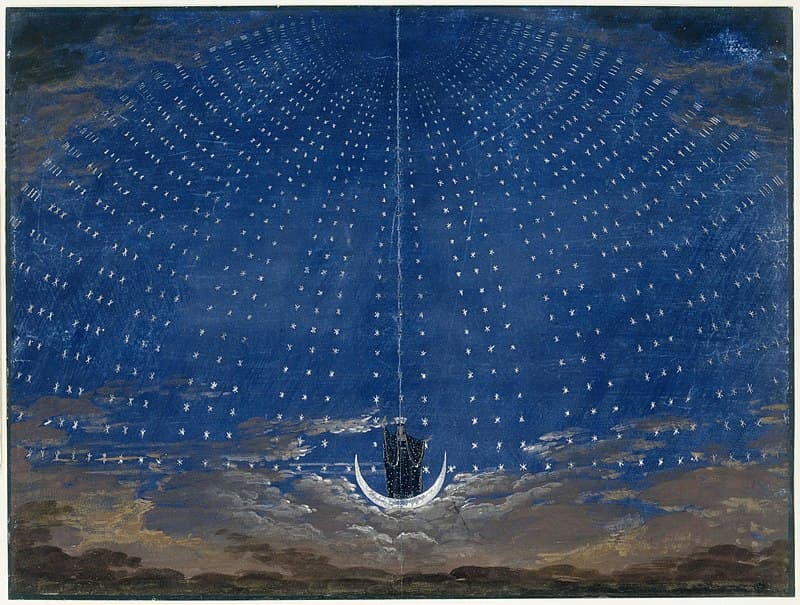
Karl Friedrich Schinkel: Stage set for the Queen of the Night (in Mozart’s Magic Flute)
It wasn’t much of a competition as Salieri’s Prima la Musica, poi le Parole (First the Music and then the Words) in the fashionable Italian style, soundly defeated Mozart’s Schauspieldirector (The Impresario). The plan of the Emperor, who was hoping for Mozart and German opera to win the day, failed badly that evening. However, Mozart soon demonstrated his mastery of both genres with Le nozze di Figaro and the Magic Flute. And in the end, of course, he did accomplish what he set out to do in his famous quote.
“I care very little for Salzburg and not at all for the archbishop; I shit on both of them”
The city of Salzburg has always been a small but pretentious provincial town. A few selected families got very rich from the salt trade, and they controlled and dominated virtually all aspects of civic and ecclesiastical life. That ruling civic elite had very little interest in having a gifted composer interfere with their conservative practices. Mozart was the musical servant of Archbishop Hieronymus von Colloredo, and he was well aware of Mozart’s distaste for the city and for his own person.
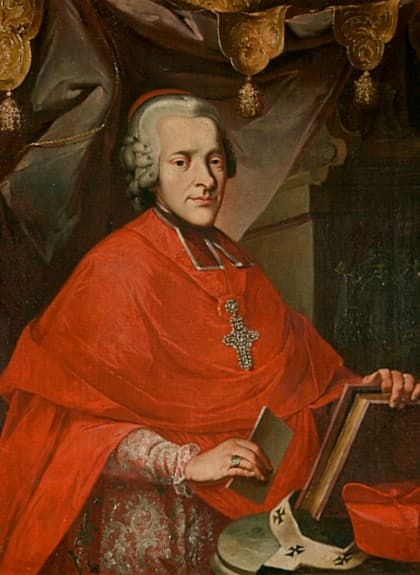
Hieronymus von Colloredo (1732-1812), Prince-Archbishop of Salzburg
The Archbishop became exceptionally annoyed with Mozart’s frequent absences resulting in a number of heated arguments. Breaking with the Archbishop was not going to be easy, and Mozart lobbied and even begged his father for support. He wanted to be a freelance musician, and was rightfully tired of being “spoken to as if I had been some miserable beggar.” Their working contract was resolved in May 1781, when the chief chamberlain delivered a swift kick to Mozart’s backside. Isn’t it ironic that present-day Salzburg continues to reap the financial rewards of a relationship that never existed?
“Death, when we come to consider it closely, is the true goal of our existence”
Wolfgang Amadeus Mozart lived during a period of history when high mortality was simply a fact of life. Several of his siblings died in childhood, and the union of Wolfgang and Constanze produced six children, but only two survived infancy. Wolfgang was deeply affected by the death of his father, and his mother died of a long and painful illness. His own health had started to deteriorate at the age of five. He suffered from rheumatism, which frequently caused kidney infections that confined him to bed.

Austria, Vienna, St. Marx Cemetery, The gravestone of Wolfgang Amadeus Mozart
Mozart had plenty of time to consider his own mortality, and he writes, “I have formed during the last few years such close relationships with this best and truest friend of mankind that death’s image is not only no longer terrifying to me, but is indeed very soothing and consoling, and I thank my God for graciously granting me the opportunity… of learning that death is the key which unlocks the door to our true happiness. I never lie down at night without reflecting that, young as I am, I may not live to see another day.”
“Shit in your bed and make it burst”
The nine surviving letters by Wolfgang Amadeus Mozart to his cousin Maria Anna Thekla Mozart are known as the “Bäsle Letters.” She was the daughter of one of the brothers of Mozart’s father Leopold, and in his letters Mozart famously uses direct and frank language, which is sometimes drastically vulgar and spiced with anal-erotic fantasies. This kind of scatological humor has puzzled scholars, and more recently, it is claimed to originate in psychiatric conditions from which Mozart supposedly suffered.
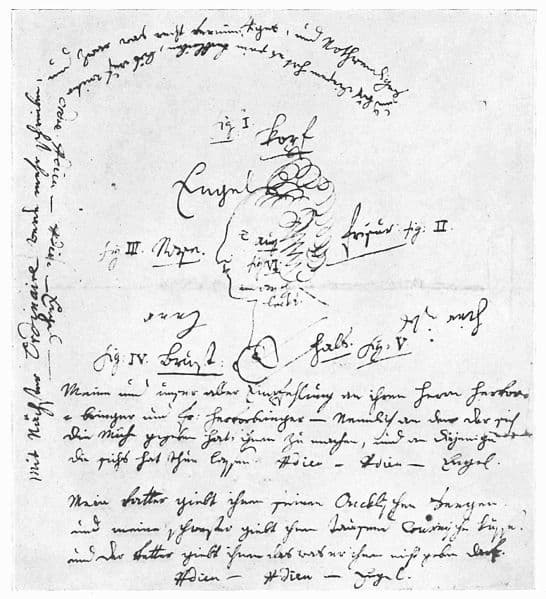
A drawing by Mozart in his Basel Letters to her cousin Maria Anna Thekla
For some commentators, “Mozart was able for a moment to forget the continuous pressures of an uncertain future, and allowed his light-hearted and humorous side of his character to come through.” One thing for sure, “these letters embarrass us, and we have tried to suppress them, trivialize them, or explain them away with pathological excuses.” It might well be that 18th-century scatological humor was far more public and mainstream, and it might well have suggested a political dimension. In a letter to his father, he describes the aristocrats present at a concert in Augsburg as “Duchess Smackarse, Countess Pleasurepisser, the Princess Stinkmess, and the two Princes Potbelly von Pigdick.”
“What’s even worse than a flute? – Two flutes!”
We still don’t know for certain if this famous quote can be wholly attributed to Wolfgang Amadeus Mozart. However, we do know that he did not like the sound of the solo flute and found it difficult to compose for the instrument. As he was struggling to fulfill a commission for the wealthy amateur flautist he truly loathed, he writes to his father. “I never have a quiet hour here… besides, one is not always in the mood for working. I could certainly scribble things the whole day long, but when a composition of this kind goes out into the world, naturally I do not want to be ashamed of my name on the title page. Moreover, you know I am quite powerless to write for an instrument (the flute) which I cannot bear.”
As we might well imagine, countless famous quotes by Wolfgang Amadeus Mozart have been misattributed. I guess, if you are famous and dead, people are ever so happy to put words in your mouth. What is your favorite Mozart quote?